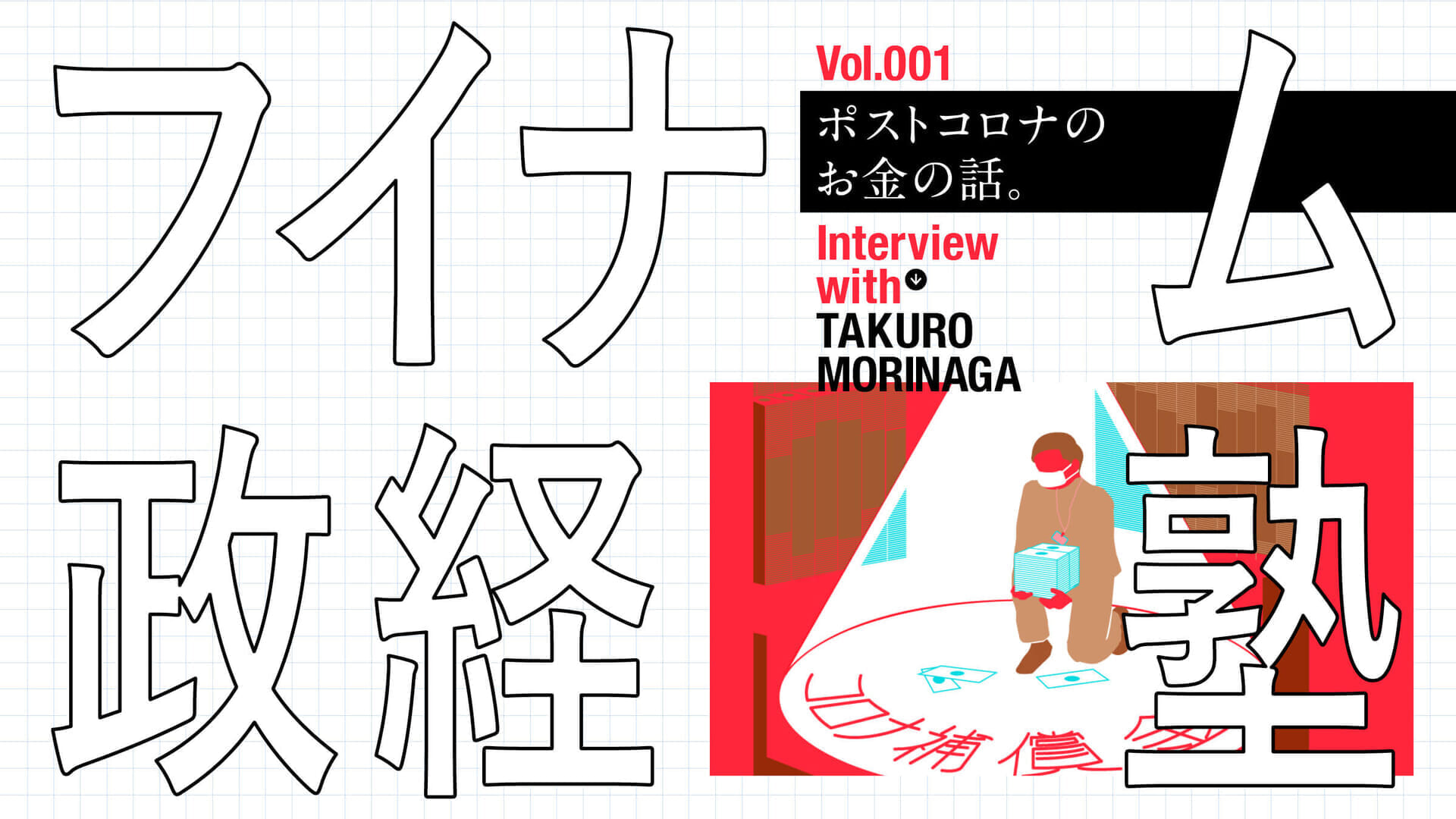The money you get in Corona will take more than that in future taxes!
The first infected person was found in December 2019 with the new coronavirus. In the months since then, the number of infected people has expanded to more than 3 million. The whole world is in turmoil, but here in Japan, too, there are daily news reports about coronas, including stories about abenomasks and the collapse of healthcare. Of particular concern are the stories about money. The recently decided "100,000 yen per person. I think there are many people who are happy to hear about the "new year". . However, it seems that we should not be happy or sad only for the immediate future. We asked Mr. Morinaga where the money came from and who will pay the bill in the future.
After all, how much compensation does Corona provide?

It has been determined that approximately 25 trillion yen will be allocated for compensation related to Corona (as of April 30, 2020). This includes 13 trillion yen for 100,000 yen benefits for all citizens, 2.3 trillion yen for benefits for small and medium enterprises and sole proprietors, , 1.5 trillion yen for reserve funds, and 1.5 trillion yen for temporary grants to the regions. . and 1 trillion yen for temporary grants to local governments. First, Mr. Morinaga told us that this1 trillion yen in temporary grantsAbout.
'There are a lot of things that concern me, though,Temporary grants to localities are too small.I believe that this is a good idea. This is to be used for businesses that respond to requests for closure, but there is no way it will be enough. Of all the prefectures in Japan, Tokyo is the richest, so it is still good that it can pour more than 800 billion yen into the Corona program in addition to the national budget, but this is not the case for local governments, which have no money. If we don't get more temporary subsidies, local businesses will become more and more exhausted. . I believe that this will have a ripple effect on various areas. However, the Ministry of Finance is putting up a tremendous amount of resistance.
In the U.S., 300 trillion yen (including additional budget) has been poured into Corona-related compensation. . Germany, known as a thrifty country, has decided to provide compensation with an unlimited budget. Among themJapan is 25 trillion yen , and compensation for lost time is 1 trillion yen. You can see how little it is. So why are they so reluctant to pay out so much money?
Some people say, "It's DNA, so it can't be helped," but in any case, the Ministry of Finance is always trying to increase tax revenues by as much as possible and decrease expenditures by as little as possible. . That is the kind of training I have been given since I joined the Ministry of Finance. So, even in an emergency situation, they will never spend more than the minimum amount necessary.Austerity is always a priority.. it's a living thing. . I think it's the Treasury Department's own sick joke. In short, they are too stingy.
. Austerity is a move to make the government spend less money. . such as raising the sales tax rate or extending the age at which one can receive a pension from 65 to 70.
Where will the money come from to compensate?

Everyone thinks that more money would be nice, but to put it bluntly, there is no such money in Japan. Taxes can't possibly cover it. So, the government issues more bonds. Government bonds are the national debt.
Japan's national debt is now about 1,300 trillion yen . . In addition, the debt continues to increase by 50 trillion yen per year. And on top of that, there is the Corona compensation. Aren't you a little worried? . I'm afraid that we have so much debt that we will go bankrupt. However, "theJapan will not go bankrupt , no matter how much government debt it has.." says Morinaga. . there is a new economic theory called MMT. It has been attracting attention since last year, 'A New Currency Concept." It stands for Modern Monetary Theory, or in Japanese, modern monetary theory. Using this theory, there can be no economic collapse.
Let me briefly explain what MMT means. The Bank of Japan issues Japan's money, right? And the Bank of Japan is like a subsidiary of the Japanese government. So, if there is an emergency,. the Japanese government can issue an order to print money at any time.This is a brief overview of MMT.
Conversely, countries in the Eurozone cannot issue their own currency on their own, so they end up going bankrupt like Greece . I will explain MMT thoroughly next time.
And another reason not to break the bank,Interest rates on government bondsHe says that you can tell by looking at the
. "After Greece's financial collapse, the interest rate on Greek government bonds was up to about 40 percent, calculated at $400,000 interest on a $1,000,000 debt. However,Japan and Germany have zero interest rates on their bonds right now."
Think about it: we have a huge debt of 1,300 trillion yen, yet interest rates are zero. Normally, one would not want to lend money to such a debt-ridden country, and even if they did, they would charge a high interest rate because they are not trustworthy. What this shows is that other countries see Japan as a country that can print money when the time comes and will not go bankrupt.
Young people paying the Corona tax .
Having explained that the source of funds is government bonds (debt) , the next step is how to pay for it.
After the Great East Japan Earthquake,special income tax for recovery. was established. You all also pay an additional 2.1 percent in income tax as a reconstruction tax. So, even after Corona,Corona taxIt is quite possible that they will do the same thing with the reconstruction tax in the form of a
A person with a monthly income of 300,000 yen (no bonus, single person) pays about 180 yen per month in reconstruction tax. . 2,160 yen per year, which would be paid for 24 years, which is about 50,000 yen to be paid. If the Corona tax were introduced,Up to 6 percent. Mr. Morinaga expects that the Corona tax will be added to and collected by the company. If this is the case, the amount of Corona tax to be paid is 6,000 yen per year. If the tax were to continue for 20 years, it would amount to 120,000 yen. . This is more than the 100,000 yen that will be paid.
Like the reconstruction tax, it is deducted from income tax, so most pensioners do not have to pay it. Therefore,Young people pay the mostSo that's what we're going to do.
. "That is just the Ministry of Finance's way of thinking, and based on the MMT theory I mentioned earlier, I believe that future tax hikes are completely unnecessary. I also have a faint hope that Prime Minister Abe, despite the opposition of the Ministry of Finance, has suppressed their opinions and changed the benefit to a flat 100,000 yen payment. Was it because the people's anger was heard, or was it because he had some kind of a weakness? Anyway, since Prime Minister Abe showed a little bit of determination this time, I think there is a small chance that he will fight the next election on the banner of freezing the consumption tax. That would give the LDP an overwhelming victory.
What will happen to the after-corona world?

Masks are still in short supply. Tourist areas are all deserted. . This is because we relied on China for most of our manufacturing, and it is a testament to our dependence on foreign tourists.
Because of this, Morinaga says, people's lifestyles will change before and after the Corona.
Since the fall of the Berlin Wall until now,Global capitalism sweeps the world. has been done. It is a system in which people who make money by moving money, rather than working to make money, make a lot of money. This time, the system came to a halt. There were many people who lost a lot of money. So, again,I think the time will come when you'll have to work diligently to make money.I think. Also,Urban concentration. I suspect that this will also ease the situation. After all, the basic economic structure of Tokyo is a state in which there is a very wealthy class and 10 or 20 times as many servants. Rents are also expensive. The number of people who realize that something is wrong is already increasing, and the number of inquiries to the "Hometown Returning Home Support Center" has been increasing dramatically. Until nowEvery trend is reversing in a big way.I'm sure."
There are jobs and things and everything in the cities. But with this Corona fiasco,How vulnerable cities are to disasters.The "new" regions have been the focus of attention in the past, but it seems that this trend is about to accelerate. The regions have been the focus of attention in the past, but it seems that this trend will accelerate quickly.
And what we have learned so far in the Corona fiasco is thatThe importance of speaking up.. . If I had not raised my voice, it would have been a wagyu coupon, not a cash benefit. . There would have been no 100,000 yen per person. This was possible because more people were interested in politics and listened to what politicians had to say than during normal times. We need to continue to be interested in politics and to speak up when we think something is wrong, in order to make the world a better place after the corona convergence.

Takuro Morinaga
Born in 1957 . Economic analyst. After working for the Japan Monopoly Public Corporation, the Japan Center for Economic Research, and the General Planning Bureau of the Economic Planning Agency, he became a chief researcher at Sanwa Research Institute (now Mitsubishi Tokyo UFJ Research and Consulting) in 1991, and is currently a professor at Dokkyo University.









